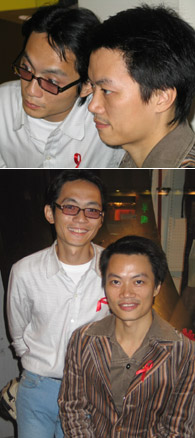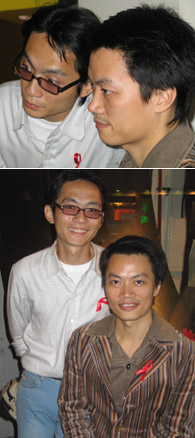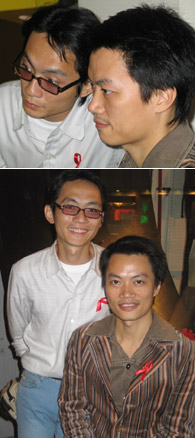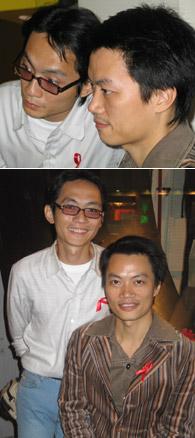Fready Wu hopes to take the plunge next year. She's thinking of a spring wedding in Hong Kong, with a simple ceremony. But Wu is a lesbian and if her partner says yes, they will instead be making a long trip to Toronto.

Gay newlyweds Roddy Shaw and partner Nelson Ng
"Marriage is a very serious step in any relationship, not one to be entered into lightly, and I don't see why we can't make this public commitment to each other," says Wu. "Sure, we can make this promise to each other privately, but people will think it is just a game."
As she summons up the courage to pop the question to her partner, whom she asked not be identified, Wu has examining the obstacles to same-sex marriage in Hong Kong.
The experience of her friends Roddy Shaw, 36, and Nelson Ng, 31, who married in Toronto in September, is far from encouraging despite the rising tide of social change elsewhere in the Chinese and English-speaking worlds.
In the UK, the Blair Government on November 26 put civil partnership legislation on its agenda for the coming parliamentary year, granting same-sex couples the same rights as married heterosexuals.
The United States seems committed to a probably nasty debate of the issue in the run-up to next year's presidential elections after the Massachusetts Supreme Judicial Court struck down as unconstitutional the State's bar on same-sex marriage, and sought to redefine what marriage means in modern society.
Shaw and Ng have been closely watching those international developments as they prepare for the next round of their two-year bureaucratic battle, which began with Hong Kong's Inland Revenue Department over the spousal tax allowance.
They believe they now have at least a case under international human rights, covered by Hong Kong's Bill of Rights, and Article 37 of the Basic Law, which states: "The freedom of marriage of Hong Kong residents and their right to raise a family freely shall be protected by law."
"We expect to begin our case in the next few months," says Shaw, who recently completed his master of laws at Hong Kong University and heads Civil Rights for Sexual Diversities, a non-governmental organisation he set up in 1999.
The two Chinese met in 1998 and fell in love. They decided to live together, their finances are intertwined, and they depend on each other for emotional support. Shaw supported Ng while he studied fulltime for his master degree in theology at the Chinese University, paying the rent and all the bills.
"And while I studied this year for my Master of Laws, he's supporting me. Nelson has a clinic. He's a physiotherapist. I have no income and, though it's not a huge amount of money, for a couple with only one income the spousal tax allowance would really help."
In 2001, while visiting friends in Boston, Massachusetts, they were joined in a civil union in neighbouring Vermont, the only state to give full legal marital rights to same-sex couples in the US.
They approached the Inland Revenue Department to recognise their formal relationship, as it does when the couple is a man and a woman. After a year of correspondence, their application was rejected. Shaw says one of the reasons given was "that ours is not a 'marriage' per se, thus cannot be recognised according to the laws in Hong Kong."

Gay newlyweds Roddy Shaw and partner Nelson Ng
Marriage brings with it a number of protections in Hong Kong, including recognition as next-of-kin should something happen to a partner, inheritance rights, and access to benefits such as cheap housing loans and tax allowances.
Shaw and Ng are also considering asking for a review by Hong Kong's Legislative Council, and they have strong and vocal support from some councillors, such as Cyd Ho of Frontier, who says, "This is about social justice."
As things stand, the Secretary for Justice, Elsie Leung, says Hong Kong does not recognise the marriage in Canada of Shaw and Ng, though she does not rule out a change in that position in the future.
Leung says marriage is defined in Hong Kong as between a man and a woman.
"As such, gay marriage is not recognised," her office said. "But she [the justice secretary] does not rule out the possibility that should the courts find this to be in violation of human rights, the Government may consider a suitable response."
Leung said the Hong Kong public "has different views on the issue" and the government "will not rush into a decision."
The Secretary for Home Affairs, Patrick Ho, said through a spokesman: "As far as same-sex marriage is concerned, there is no change to our existing policy."
He reiterated that Section 40 of the Marriage Ordinance recognises marriage as "the voluntary union for life of one man and one woman to the exclusion of all others."
"Since marriage is an issue that involves social-moral values and family ethics, it should be left for the community to judge," the Home Affairs spokesman said, adding: "Our society upholds monogamous marriage and our legislation only reflects the consensus reached by the community on the issue."
The Hong Kong administration has long held that the predominantly Chinese society is not ready to accept homosexuals, and education rather than legislation is necessary to change attitudes. This argument has been used since 1994 to block sexual orientation as an area in need of legislative protection under anti-discrimination laws.
Councillor Ho says the government "is very timid" on the issue of homosexuality and has done nothing to prepare for the eventual recognition of the rights of same-sex couples, which would require some substantial changes to public policy.
"They refuse to acknowledge same-sex marriage because they don't want to incur the additional expense," she says. "They look at it only as a welfare-and-benefits issue� rather than as an issue of equal opportunity for people of different sexual orientation."
The British Government reckons on an annual cost to government of ₤75 million in 2010 and up to ₤240 million in 2050, mainly to do with pension entitlements. The cost to the private sector is estimated at up to ₤20 million a year.
Those numbers could also be read as the amount being unfairly withheld by not recognising same-sex couples, says Shaw.

Gay newlyweds Roddy Shaw and partner Nelson Ng
As far as the courts are concerned, Ho says a test case will make clear the stance of the judiciary towards recognising the rights of same-sex couples, as well as heterosexual de facto couples.
But it is unlikely Hong Kong will consider changing the law to recognise same-sex couples any time soon, says Dr Bart Rwezaura, senior lecturer in the Faculty of Law at the University of Hong Kong.
"If Hong Kong is going to do anything, first of all Britain will be looked upon as a kind of model from the common law point of view and, secondly, in Hong Kong itself there has to be active political pressure to keep the issue on the agenda," Rwezaura says.
Amnesty International is critical of the SAR Government's performance over the past six years, not least on the issue of discrimination.
"Using the 'public opinion' argument against legislation just doesn't wash; you can't use the majority's opinion in order to avoid doing anything about discrimination against a minority," says Amnesty's Hong Kong representative, Liz Whitelam.
Developments in Taiwan would suggest any perceived opposition to equal rights for homosexuals, including in terms of marriage, cannot be attributed to the fact that Hong Kong is a predominantly Chinese society.
Although the proposed legislation has been delayed due to what observers say might potentially cause a backlash in the run-up to next year's referendum [to demand Beijing withdraw missiles targeting the island, considered a renegade province by China], the proposed bill if passed would extend full and equal rights to homosexuals, including the right to form a family.
Gay activists in Taipei say President Chen Shui-ban, with his Democratic Progressive Party (DPP) facing defeat next year by the conservative Kuomintang (KMT), has been promising the law since his election in 2000. They are withholding celebration until the human rights law is actually passed.
"If our government can really introduce this law it will make this country very special in Asia," says Hsu Yu-shen, whose marriage to Uruguayan partner Gray Harriman and their "wedding banquet" in 1996 gained international attention.
The 42-year-old writer says with the end of martial law in Taiwan in July 1987, "the whole of society changed."
Hong Kong may also be changing. A survey conducted in March last year by the Polytechnic University found that Hong Kong people support equal rights for gays and lesbians.
The survey polled 1,604 people, with 521 completed interviews across a wide age range. Of the respondents, 70 per cent agreed that homosexuals and heterosexuals should have equal rights in terms of building a family and 73 per cent in terms of enjoying the same social welfare benefits, while 72.6 per cent did not think giving homosexuals equal rights will dilute social resources. More support came from younger age groups, and from women.
Given that Hong Kong law tends to look towards Britain for precedent, the Blair Government inclusion in the Queen's Speech of legislation to allow gay and lesbian couples the same rights and responsibilities as married couples in all but name, will not go unnoticed.

Gay newlyweds Roddy Shaw and partner Nelson Ng
Fellow activist Chung To, of the Chi Heng Foundation, admits recognition of same-sex couples doesn't need to be called "marriage," so long as it accords spousal status and benefits resulting from such legal recognition in areas such as tax, medical coverage, housing, insurance and the like, but he rejects a "separate but equal" system for lesbians and gays.
"In some countries with strong religious traditions, pragmatic activists are willing to settle for domestic partnership or civil union for the time being. However, the creation of a separate system will only open the way for more discrimination in the future," To says.
He doubts there will be any rush down the aisle by Hong Kong's gays and lesbians if marriage is made available, and the British Government doesn't think its legislation will cause any queues.
It estimates that even under a high take-up scenario matching the proportion of marriages in the heterosexual population, about 33 per cent of gay and lesbian couples will register partnerships. Based on the experience of similar arrangements in the EU, the rate of civil partnership registration will likely be one-tenth the heterosexual marriage rate - or 3.3 per cent.
"Not being able to get married because the law prohibits you from doing so is very different from having the right to marry and choosing not to do so," says To.
In the US, the Massachusetts Supreme Judicial Court ruled on November 18 it was unconstitutional to deny same-sex couples the right to marriage and rejected the State's claim that the primary purpose of marriage was procreation.
The court ruled it is the "exclusive and permanent commitment of the marriage partners to one another, not the begetting of children, that is the sine qua non of marriage."
President George Bush quickly pledged "to do what is necessary to defend the sanctity of marriage."
It is a difficult issue, and one Hong Kong will have to face, though the small and slightly-built Fready Wu knows that nothing happens in the SAR unless people are willing to stand up and make their voices heard. She feels stronger after July 1.
"A lot of my friends wonder what difference it makes being married. They already live together and share everything. But I don't like the feeling I get when I'm filling out forms and they make me tell lies. I was brought up to be honest."











 列印版本
列印版本










讀者回應
搶先發表第一個回應吧!
請先登入再使用此功能。